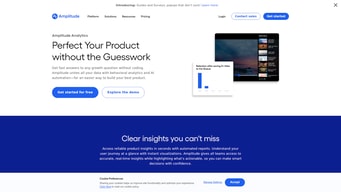

Unclaimed: Are are working at Amplitude Analytics ?
Amplitude Analytics Reviews & Product Details
Amplitude is an analytics tool designed to support businesses by helping them understand user behavior and giving them key insights that can help them improve their products. It offers tools such as behavior tracking, funnel analysis, as well as A/B testing that combines to help companies make data-driven decisions that optimize products and drive business growth.


| Capabilities |
AI
API
|
|---|---|
| Segment |
Small Business
Mid Market
Enterprise
|
| Deployment | Cloud / SaaS / Web-Based, Mobile Android, Mobile iPad, Mobile iPhone |
| Training | Documentation |
| Languages | English |


Compare Amplitude Analytics with other popular tools in the same category.

I recommend Amplitude to most of my clients. It lets them view both online activity as well as offline, so that the whole journey can be visualized. Its marketing features are the icing on the cake, and it's great to see them keep expanding in that area.
Amplitude is primarily a visualization and data exploration tool. Its support for tablular reports/pivots is very limited. So it is always necessary to have a secondary reporting tool for this sort of analysis - whether that's a spreadsheet or a dashboarding tool.
Amplitude gives much more detail and drill-down than Google Analytics and other common analytics tools. I can drill down to individual contacts and see their full journey. This gives my clients the ability to explore data and find insights that would be impossible with most other tools.
Ease of chart settings Wide range of analysis tools Service response speed
I would like to be able to pause the automatic display when setting up charts. When you work with heavy queries, you want first to configure the graph and then run it. Otherwise, every click is a change, and it can take up to a minute for any action.
user behavior analytics conversions, retention, churn, sales analytics of the most engaged users loss analytics analysis of user problems and errors
How ease is to create cohorts and creat segmentations
The dashboards are not so beautiful and ease to read
Is helping me to track engagement of users with a product with wich I work
I use Amplitude on a daily basis to quickly check whether my assumptions are correct or not. The ease of creating charts is what I like the most.
Using the tool requires a good understanding of your event analytics data. Therefore, it can be difficult for non-analysts to extract the correct insights from a chart.
Amplitude helps us to transition from gut-based product decisions toward more data-informed product decisions.
I like the layout of the dashboards. The setup of the charts is simple and straightforward. The questions you can answer can be broad or specific.
I wish more clients would upgrade to notebooks and unlock the ability to cohort!
We are solving problems of product-market fit and where to spend dev resources with additional features. It has also helped clients see the importance of marketing differently to users or in adding to their tech stack.
Easy to use UI that anyone can ramp up to quickly and build funnels or see user interaction insights
Manual instrumentation of events takes time
Seeing user funnels and being able to share quickly and easily
Self-service debugging, analytics. I can get answers to my questions without waiting on the data team to tell me. This makes my work much faster.
Nothing I can think of. It's been helpful for me.
It allows me to answer product questions to understand scope of an issue, and how customers are behaving given certain conditions that Incan filter on. We care a lot about new vs existing customer behavior and it's easy to apply that lens with Amplitude. It's also been helpful to identify issues (an event issue vs production issue).
Funnel Analysis & Segmentation - while these are very basic functionalities, it is what we use the most often. This enables us to understand if we are hitting our success criteria and the impact of new releases on KPIs such as conversion and AOV.
Level of customization in alerting. While we can set up alerting and do use it regularly there is a limitation to what can trigger an alert which decreases the usefulness of the functionality.
Amplitude enables us to understand usage of new features we release & how that impacts our KPIs such as conversion, AOV.
Easy to use for tech and non-tech folks alike. Iteratively (aka Amplitude Data after the acquisition) also makes it easy to manage the events/properties in Amplitude across everyone interested in the data.
No particular complaints on the product.
Any modern product building needs instrumentation and analytics. Who wants to fly blind?
I love that I can get granular details of actions that a user completes when a bug arises. The Customer Support team is better able to identify and communicate a bug to the engineering team, which leads to faster resolution times. Our Customer Success team can use Amplitude to help understand customer behavior and when they should intervene to help a customer out.
The learning curve is a bit steep to get the deeper analyses down. It takes a skilled user to train a novice.
Not only can I use the user journey feature to help identify and diagnose bugs, I'm able to view A/B tests and see how different changes can affect a multitude of users. This lets us experiment to make the right changes for our product.

